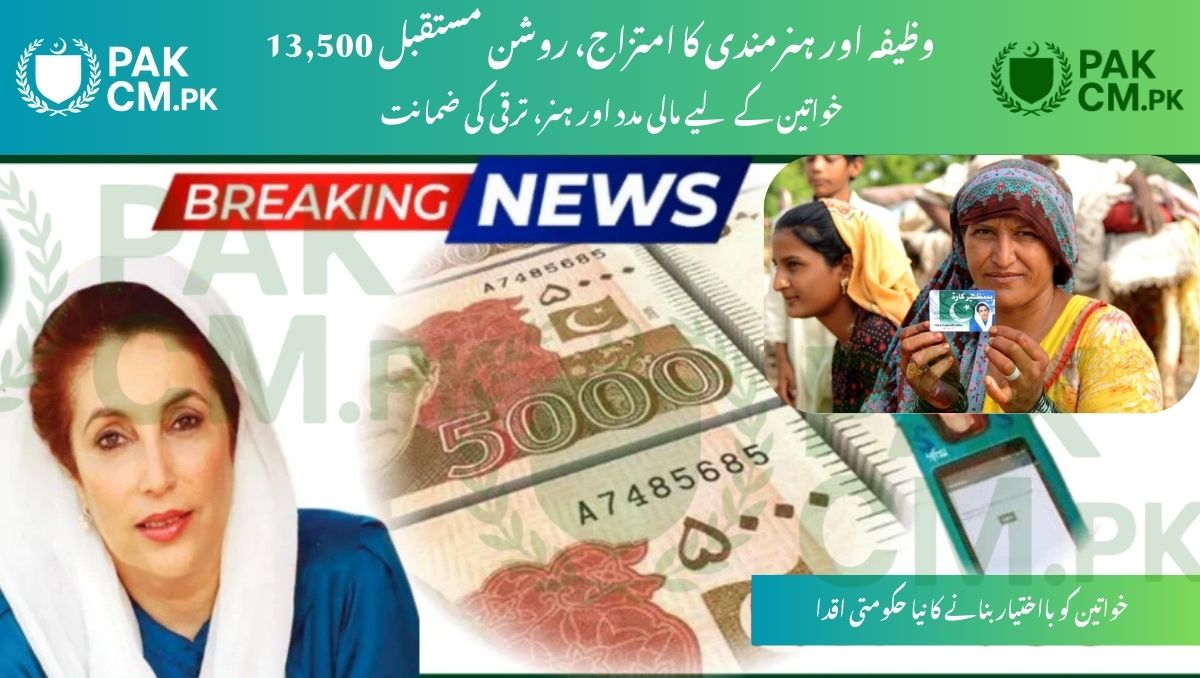BISP Increases Kafalat Stipend BISP has taken a historic step to increase financial assistance to millions of low-income poor families across Pakistan. This scholarship has been increased to Rs. 13,500. BISP Increases Kafalat Stipend This increase, along with the launch of the Skill Development Program, is the best effort of the Government of Pakistan to reduce poverty, empower women and promote self-reliance through skill development.
Under the Benazir Income Support Program, a comprehensive national strategy is being implemented with pure financial assistance towards strengthening the social safety net and sustainable economic empowerment.

BISP Increases Kafalat Stipend: A Lifeline for Millions of Women
The Government of Pakistan has publicly announced that it has increased the BISP maintenance allowance from Rs 12,000 to Rs 13,500 per quarter for 2025. The increase is aimed at combating the pressure of rising inflation, which has disproportionately affected low-income poor households, generally for female-headed households in rural areas.
A primary objective of the Kafalat program is to target poor women. It provides them with unconditional cash transfers that help them meet basic needs such as food, healthcare, and education. By increasing the amount of the quarterly payment, the Government of Pakistan intends to ensure that women are better able to support their families in difficult economic times.
Key Highlights:
🔺 Stipend Increase: Raised to Rs13,500 per quarter (previously Rs12,000)
👩👧 Number of Beneficiaries: Over 9 million women registered under Kafalat
🏧 Disbursement Channels: Payments made via biometric verification at ATMs, designated banks, and mobile wallets
📋 Digital Enrollment: Continued use of the Dynamic Registry and NSER survey to identify new eligible families
Also Read:Mera Pakistan Mera Ghar Scheme 2025 – How to Apply, Eligibility & Latest News
Launch of ‘Hunarmand’: A Vision Beyond Financial Aid
The Government of Pakistan, in addition to increasing financial assistance, has launched a program called BISC, which is an excellent step aimed at providing women and youth with vocational and technical skills. This change represents a shift towards improving welfare work, which helps poor people break the cycle of poverty through entrepreneurship.
The program has been launched through the National Vocational and Technical Training Commission in collaboration with institutions. Skills that are proven to enable people to work on higher-level skills are being worked on.
🧵 Tailoring and Embroidery
💻 Computer and IT Literacy
📱 Mobile Repair and Electronics
🎨 Handicrafts and Local Artisanry
🔧 Plumbing and Electrical Work
🛒 E-commerce and Online Freelancing
Participants will receive certification upon completion and may also be provided with toolkits or seed capital to start small businesses. This initiative particularly targets unemployed youth and women in marginalized communities who have limited access to education and training.
Also Read:CM Punjab Free E-Bike Registration 2025 Latest Update for Students
BISP Increases Kafalat Stipend Integrated Social Welfare and Empowerment
The developments where BISP increases sponsorship stipends and launches the Hunarmand represent more than news—terms like social safety nets, women’s empowerment in Pakistan, vocational training programs, and income support measures are naturally associated with this material and are likely to attract both domestic and international readers interested in development economics and welfare reform.
These changes also feed into broader keywords such as:
💰 Government Financial Aid in Pakistan 2025
📰 Benazir Income Support Latest Update
👩🏫 Skill Development for Women in South Asia
📉 Poverty Reduction Programs Pakistan
🏛️ Public Welfare Reforms 2025
Incorporating these naturally within content helps improve visibility and relevance for search engines while staying contextually rich for readers.
Also Read:PM Laptop Scheme 2025 for AIOU and VU Students – Apply Now!
The Impact on Beneficiaries BISP Increases Kafalat Stipend
Women across Pakistan, especially in rural areas like Tharparkar, Bahawalpur, and Gilgit-Baltistan, have responded positively to both the increase in stipends and the launch of Hunarmand. Cash transfers provide short-term stability, while vocational training provides a path to independence in earning an income.
Testimonials from the field show:
👩👧 Mothers using the stipend to keep children in school
🧵 Women starting home-based tailoring businesses post-training
💻 Youth entering freelance markets after IT certification
🍽️ Families reporting improved health due to better nutrition and financial capacity
These stories demonstrate the power of a dual strategy—direct cash relief plus skill development—in creating sustainable, grassroots-level economic transformation.
Challenges and Government Strategy
Although the increase in sponsorship and the issuance of skilled workers are commendable, several implementation challenges remain:
🔍 Ensuring transparent beneficiary selection via the updated NSER survey
📶 Overcoming technological barriers in rural areas for digital payments
💼 Providing job placement support after skill training
💰 Sustaining funding for long-term program viability
A Step Toward Sustainable Social Protection
🔑 Social Protection Model
💸 Poverty Alleviation
💪 Empowering Citizens
📊 International Agencies
🌍 Blueprint for Developing Nations
Also Read:8171 Ehsaas Program 2025 – How to Apply Online for Monthly Cash Support
Conclusion
The recent steps taken by the Government of Pakistan, including the increase in BISP stipends and the launch of the Hunarmand Skill Development Program, signify a major advancement towards poverty reduction and women’s empowerment. By combining cash relief with vocational training, the government is fostering both short-term stability and long-term economic independence. However, challenges such as transparent beneficiary selection and technological barriers remain. Despite these, the holistic approach is positioning Pakistan as a leader in sustainable social protection. This model has the potential to serve as a blueprint for other nations facing similar challenges.
FAQ’s
What is the current BISP stipend amount for 2025?
In 2025, the BISP Kafalat stipend has been increased to Rs. 13,500 per quarter, up from Rs. 12,000. This increase aims to support low-income households, especially female-headed families in rural areas, in the face of rising inflation.
How does the Hunarmand Skill Development Program contribute to poverty reduction in Pakistan?
The Hunarmand Program, launched alongside the stipend increase, provides vocational training to women and youth, empowering them with technical skills to break the cycle of poverty. This initiative aims to equip marginalized groups with skills such as tailoring, IT literacy, mobile repair, and more, offering a sustainable path to economic empowerment.
How does BISP help with women’s empowerment in rural areas?
The BISP Kafalat Program specifically targets women, offering them unconditional cash transfers to meet basic needs like food, healthcare, and education. The increased stipend, along with the Hunarmand Program, is designed to empower women in rural Pakistan to become more self-reliant and economically independent.
How can digital enrollment improve the transparency of the BISP program?
The Digital Enrollment process, using the Dynamic Registry and the NSER survey, ensures that only eligible families receive BISP financial aid. It helps maintain transparency in the beneficiary selection process and ensures that financial assistance reaches those in genuine need, especially women and marginalized communities.
What role does vocational training play in income support measures in Pakistan?
Vocational training through the Hunarmand Program plays a critical role in income support measures by offering training in high-demand skills like plumbing, handicrafts, and e-commerce. These programs aim to provide long-term economic independence by empowering youth and women to secure better livelihoods and enter freelance markets.




